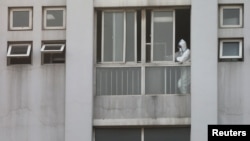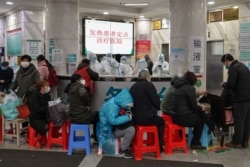Hospitals in and around the center of China's coronavirus outbreak in Wuhan say they are running so low on medical supplies that doctors and nurses have been asked to wear substandard masks or diapers so that they wouldn't have to change protective suits so frequently.
That has put the health of many of the country's frontline medical care providers at great risk.
"Due to undersupply of protective suits, many of our doctors here have to share one suit. Some of them even have to wear diapers so that they don't have to change the suits so frequently for fear of running out of them," a staff surnamed Xiao at Wuhan Puren Hospital told VOA on Monday.
"We face a terrible shortage of protective suits," she added.
Shortage of medical supplies
The hospital in Hubei province is in desperate need of 5,000 protective goggles, 20,000 N95 masks and as many protective suits as possible as it consumes 1,000 goggles and up to 3,000 masks a day, according to Xiao.
It is one of some 24 hospitals which have formally asked for donations of medical supplies from the general public including N95 and surgical masks, protective suits and hand sanitizers.
But results in the past few days have been far from satisfying since most of those private donations are of little use as they fail to live up to medical standards, many of the hospitals said.
"Alas, we are running short of lots of supplies. If you can donate. … But the problem is that most [of the general public's] donated supplies are not helpful. They do not live up to our higher medical standards," a staff, also surnamed Xiao, from Wuhan No.1 Hospital told VOA.
"We're trying all other possible avenues to replenish our supplies," she added.
Pop-up hospitals
While tackling a shortage of medical supplies, authorities in Wuhan, the epicenter of the outbreak, are also rushing to build two emergency hospitals, one of which is planned to contain 1,000 beds and be up and running by Feb. 3.
According to state media reports, the city's second such 'pop-up' hospital will offer an additional 1,300 beds in two weeks in order to treat more patients suspected of contracting the deadly pneumonia-like virus.
The move appears to signal an uphill battle for China to contain the spread of the virus.
A city health official pledged to include more hospitals to join the fight if the number of patients rise, state media reported.
The death toll for China's worst public health crisis since SARS in 2003 has risen to 81 people, including a 9-month-old baby, with more than 3,000 confirmed cases worldwide.
Emotional breakdowns
Under tremendous pressure, some medical providers working at the frontline have experienced emotional breakdowns.
A video clip circulating online showed a Chinese doctor crying over concerns of lack of hospital resources to treat patients while, in another video clip, a nurse said that she hasn't called her loved ones during the New Year holidays for fear of bursting into tears.
More importantly, she said she doesn't want her family to worry about her safety.
Medical staff, exposed to the patients but given insufficient protection, say they are growing uneasy after the first Chinese doctor reportedly died of exposure to patients on Saturday.
A staff member at Wuhan Jinyintang Hospital told VOA on Monday that the hospital has run short of surgical masks, and that some of their nurses can do nothing but hope that wearing multiple non-surgical facial masks can provide them enough protection while caring for the highly contagious patients.
Thanks to campaigns via GoFundMe, Weibo and WeChat, medical supplies reportedly are being sent to Hubei province, although almost all are directed to Wuhan.
A hospital at the neighboring city of Huanggang said it is hoping its pressure of being equally under-resourced can be relieved when donated supplies arrive later.
"Because those masks and protective suits are for one-time use, we've recently begun to ask for donated supplies. We've only received a very small portion of the delivery, most of which is probably still on the way. We are not sure how many more supplies we will have," said a staff member surnamed Yang from the Huanggang Central Hospital.






